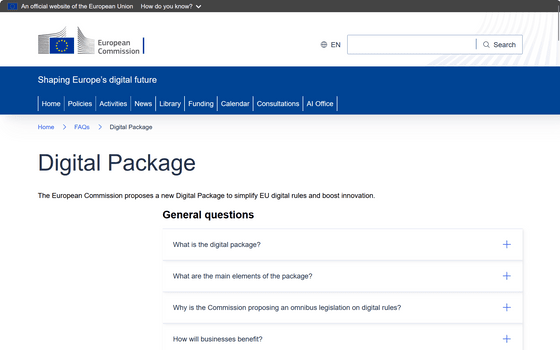EU weakens privacy and AI laws, bowing to pressure from big tech companies

The EU has imposed strict regulations on technology companies and protected the privacy of its citizens through legislation such as the General Data Protection Regulation (GDPR). It has now been reported that the EU, which has maintained a hardline stance, has relaxed the GDPR in an effort to revive its sluggish economic growth.
Digital Package | Shaping Europe's digital future

Europe's cookie nightmare is crumbling | The Verge
Europe is scaling back its landmark privacy and AI laws | The Verge
https://www.theverge.com/news/823750/european-union-ai-act-gdpr-changes
In November 2025, the European Commission proposed new amendments to the GDPR to remove some of the protections under the GDPR, making it easier for technology companies to share anonymized personal information with external parties and expanding the scope of their commercial activities, such as allowing them to legally use personal information to train AI models.
The proposed amendments also include reductions to key parts of the comprehensive AI regulation known as the 'AI Act,' which came into effect in 2024. While many elements of the Act were scheduled to come into effect in August 2026, the amendments will extend the grace period for regulating high-risk AI systems that pose 'significant risks' to health, safety, and fundamental rights, and ease the compliance burden on companies.
The AI Act is a regulatory law that would ban AI deemed to be high risk, such as AI that attempts to predict whether someone will commit a crime based on their appearance, entirely or place it under strict oversight by authorities.
AI systems with 'unacceptable risks' banned in EU - GIGAZINE

The EU's regulations are often criticized by companies for restricting the activities of technology companies and placing an excessive burden on small and medium-sized enterprises to prepare for the regulations. In submitting the proposed changes, the European Commission said, 'These will not only increase revenue for companies, but also open up opportunities for innovation and growth and reduce regulatory burdens.'
The Verge, a technology media outlet, pointed out that 'The decision comes after intense pressure for deregulation from major tech companies, President Donald Trump, and prominent insiders such as former Italian Prime Minister and former European Central Bank President Mario Draghi. It eases concerns within the EU that strict EU regulations are hindering international competitiveness.'

As part of the proposed changes, the European Commission is also proposing rules to reduce the display of 'cookie popups,' which are intrusive to users. This would mean completely eliminating risk-free popups and allowing users to centrally manage them through browser settings, thereby minimizing the display of popups. While waiting for browsers to respond, the Commission will first require that popups be simplified to just two options: 'yes' or 'no.'
The European Commission said, 'Today, when people visit websites, they are faced with numerous cookie pop-up banners requesting their consent. They find it difficult to understand what they are being asked to consent to and what will happen to their data. This complexity and the sheer number of pop-up banners mean that users are tempted to click buttons to access the sites they visit. This is not a genuine choice for citizens to protect their smartphones and computers and choose how their data is handled.'
The proposal will now go to the European Parliament and the 27 EU member states for approval.

Related Posts:
in Note, Posted by log1p_kr







